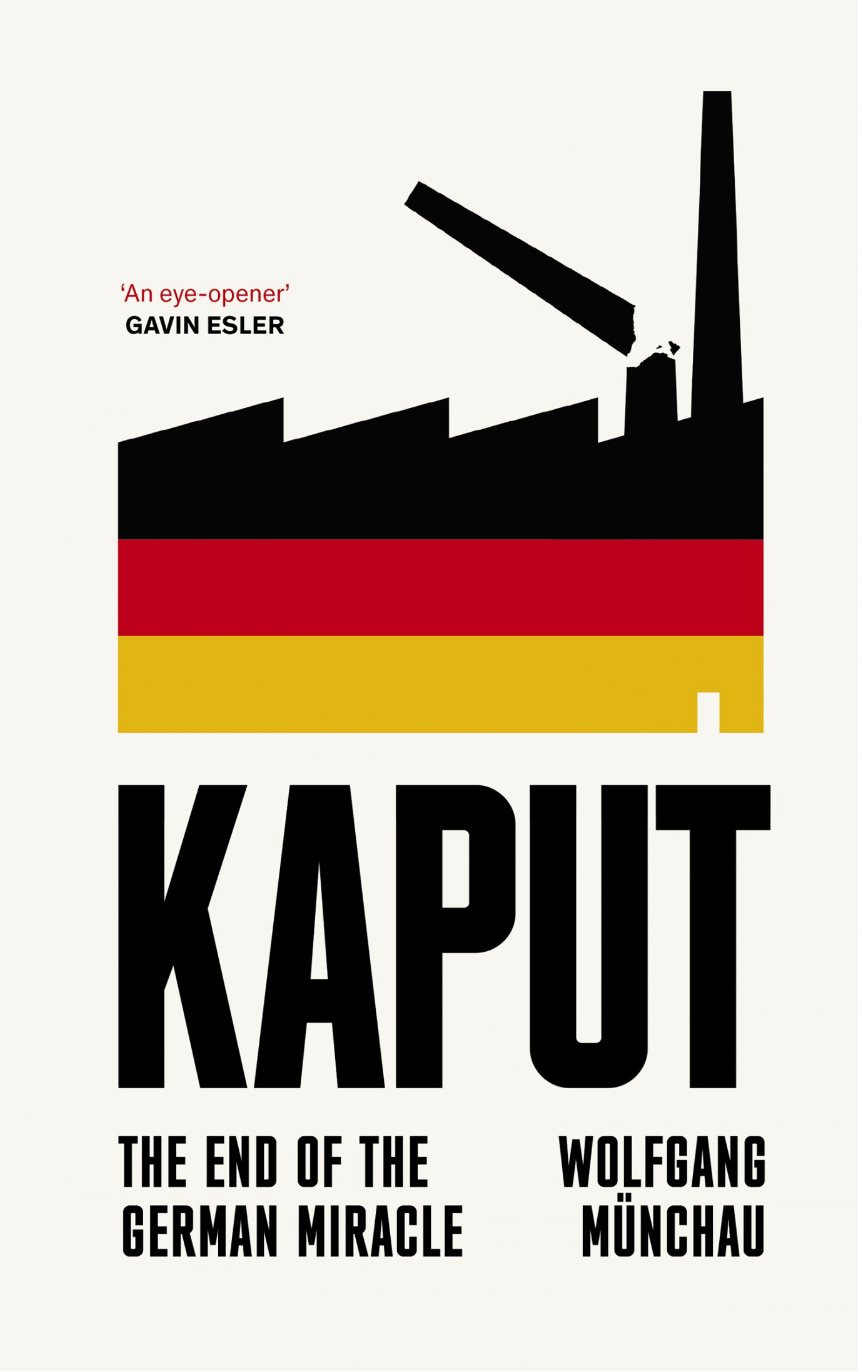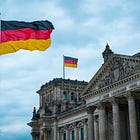Kaput
Elections for a new government should end the current paralysis of an entire country and offer a new and clear political direction
Frohe Weihnachten is just another way of saying Merry Christmas in German. As if that were not enough, after more negative data came out in recent weeks from the Eurozone economy, Germany has initiated a significant political upheaval. But let's go in order.
German industrial production fell 2.5% on a monthly basis in September, down from +2.6% in August; on a year-over-year basis, industrial production fell nearly 5%: decline was driven by all sectors. Activity in the construction sector fell by more than 1% on a monthly basis, after the first tentative signs of recovery in the summer months. At the same time, German exports fell 1.7% month-on-month in September, from +1.5% in August. The zig-zag trend in German industrial data suggests German industry has not yet entered a period of full recovery: industrial production in the third quarter is still down 2% from the second quarter.

Frohe Weihnachten è solo un altro modo di dire Buon Natale in tedesco. Come se non bastasse, dopo ulteriori dati negativi usciti nelle scorse settimane dell’economia dell’Eurozona, la Germania ha dato vita a un significativo sconvolgimento politico. Ma andiamo con ordine.
La produzione industriale tedesca è scesa del 2,5% su base mensile a Settembre, rispetto al +2,6% di Agosto; su base annua, la produzione industriale è scesa di quasi il 5%: il calo è stato determinato da tutti i settori. L'attività nel settore delle costruzioni è scesa di oltre l'1% su base mensile, dopo i primi timidi segnali di ripresa registrati nei mesi estivi. Allo stesso tempo, le esportazioni tedesche sono scese dell'1,7% al mese a Settembre, dal +1,5% al mese di Agosto. L'andamento a zig-zag dei dati industriali tedeschi suggerisce che l'industria tedesca non è ancora entrata in un periodo di piena ripresa: la produzione industriale del terzo trimestre è ancora in calo del 2% rispetto al secondo trimestre.
This piece is part of a series of 4-articles on Germany we wrote below 👇
Early elections: collapse or blessing?
And so on a serene autumn evening, here was German Chancellor Olaf Scholz announcing he had fired his Finance Minister Christian Lindner. Lindner's party (FDP) in response, left the government.
In a brief speech explaining the decision, Olaf Scholf came out in flames, accusing Lindner of breach of trust and cronyism. Scholz presented himself as a balanced leader who did not want to choose between social welfare and investment or support for Ukraine. Also recalled that he proposed to trigger the national debt brake safeguard clause for 2025, but Lindner refused to accept it. Big stuff.
All this is happening while German industry is trudging along, and has been best example of the problems of entire economy in recent years. Stuck between cyclical and structural headwinds, it has had to come to terms with the fact that traditional macroeconomic model of cheap energy (Nord Stream ring a bell?) and large, easily accessible export markets (such as China) no longer works. This is why, four and a half years after the start of pandemic, German industrial production is still more than 10% below its pre-pandemic level.
In addition to the above, Scholz explicitly stated Germany's public finances are healthy and public debt is among the lowest in Europe, clearly distancing himself from Lindner who last week described a picture of worrying public finances. Christian Lindner's official reaction shows that there was a mud wrestling and passing the buck between Scholz and Lindner.
After the agreement between SPD and CDU, Scholz announced that he will bring a vote of confidence to the German parliament on December 15: this will most likely officially bring down the government, currently held only by Social Democrats and Greens. After that, president is expected to call snap elections within two months: agreement has already listed Feb. 23 as a possible date for national elections. Based on these comments, a minority government doesn’t seem to be an option: given the endless tensions within government and clear disagreement on how to get German economy out of its current state of stagnation and structural weakness, collapse of the government could also be a blessing. Elections and a new government could and should end the current paralysis of an entire country and offer new and clear political direction and certainty.

Elezioni anticipate: crollo o benedizione?
E così in una serena (si fa per dire) sera d’autunno, ecco che il cancelliere tedesco Olaf Scholz annuncia di aver licenziato il suo ministro delle Finanze Christian Lindner. Il partito di Lindner (FDP) in tutta risposta, ha lasciato il governo.
In un breve discorso di spiegazione della decisione, Olaf Scholf ha fatto fuoco e fiamme accusando Lindner di violazione della fiducia e clientelismo. Scholz si è presentato come un leader equilibrato che non ha voluto scegliere tra il benessere sociale e gli investimenti o il sostegno all'Ucraina. Egli ha anche ricordato di aver proposto di far scattare la clausola di salvaguardia nazionale del freno al debito nazionale per il 2025, ma Lindner si è rifiutato di accettare. Roba grossa.
Tutto questo accade mentre l'industria tedesca arranca, ed è stata il miglior esempio dei problemi dell'intera economia negli ultimi anni. Bloccata tra venti contrari ciclici e strutturali, ha dovuto fare i conti con il fatto che il tradizionale modello macroeconomico di energia a basso costo (Nord Stream vi dice qualcosa?) e grandi mercati di esportazione facilmente accessibili (come la Cina) non funzionano più. Per questo motivo, a quattro anni e mezzo dall'inizio della pandemia, la produzione industriale tedesca è ancora inferiore di oltre il 10% rispetto al livello pre-pandemico.
In aggiunta a quanto detto sopra, Scholz ha dichiarato esplicitamente che le finanze pubbliche tedesche sono sane e il debito pubblico è tra i più bassi d'Europa, prendendo chiaramente le distanze da Lindner che la scorsa settimana aveva descritto un quadro di finanze pubbliche preoccupanti. La reazione ufficiale di Christian Lindner dimostra che era in atto una lotta nel fango e uno scaricabarile tra Scholz e Lindner.
Dopo l’accordo tra SPD e CDU, Scholz ha annunciato che porterà un voto di fiducia al Parlamento tedesco il 15 Dicembre: questo farà molto probabilmente cadere ufficialmente il governo, attualmente retto solo da socialdemocratici e verdi. Dopodiché il presidente dovrebbe indire elezioni lampo entro due mesi: l’accordo ha già indicato come il 23 Febbraio una data possibile per le elezioni nazionali. Sulla base di questi commenti, un governo di minoranza non sembra essere un'opzione: date le infinite tensioni all'interno del governo e il chiaro disaccordo su come far uscire l'economia tedesca dall'attuale stato di stagnazione e debolezza strutturale, il crollo del governo potrebbe anche essere una benedizione. Le elezioni e un nuovo governo potrebbero e dovrebbero porre fine all'attuale paralisi di un intero Paese e offrire nuove e chiare indicazioni e certezze politiche.
Ghost of recession appears again
Following the past few weeks, a technical recession in Germany during the winter has become our base case scenario. However, this may not directly affect DAX Index and basket of stocks that comprise it, as most of the activities of these companies are now almost all outsourced or focused on services. Looking further, Germany's growth prospects will depend to a large extent on the new government's ability to strengthen the domestic economy amid a potential trade war and even stronger industrial policies in the United States. We will see if at that point, government spending cuts and big company incentives might force some DAX companies to draw breath and scale back future values and profits.
In conclusion, it is very likely that election campaign will probably focus mainly on the economy, offering a clear strategy to restore growth and competitiveness. This will push political parties to show their position on the debt brake and issue of debt-financed investment. In the month that Donald Trump won a second term in the White House, Germany is gearing up for its first snap election in nearly 20 years, with politicians ready to offer their answers on how to «make the German economy great again».

Il fantasma della recessione appare di nuovo
A seguito di queste ultime settimane, una recessione tecnica in Germania durante l’inverno è diventato il nostro scenario di base. Questo però potrebbe non coinvolgere direttamente l’Indice DAX e il paniere di titoli che lo compongono, in quanto la maggior parte delle attività di tali aziende è oramai quasi tutto esternalizzato o concentrato sui servizi. Guardando oltre, le prospettive di crescita della Germania dipenderanno in larga misura dalla capacità del nuovo governo di rafforzare l'economia interna in un contesto di potenziale guerra commerciale e di politiche industriali ancora più forti negli Stati Uniti. Vedremo se a quel punto, tagli alla spesa pubblica e incentivi alle big company potrebbero costringere alcune aziende del DAX a tirare il fiato e ridimensionare i valori e gli utili futuri.
In conclusione, è molto probabile che la campagna elettorale si concentrerà probabilmente soprattutto sull'economia, offrendo una strategia chiara per ripristinare la crescita e la competitività. Questo spingerà i partiti politici a mostrare la propria posizione sul freno al debito e sulla questione degli investimenti finanziati dal debito. Nel mese in cui Donald Trump ha conquistato un secondo mandato alla Casa Bianca, la Germania si sta preparando alle prime elezioni lampo in quasi 20 anni, con i politici pronti a offrire le proprie risposte su come rendere «l'economia tedesca di nuovo grande».





